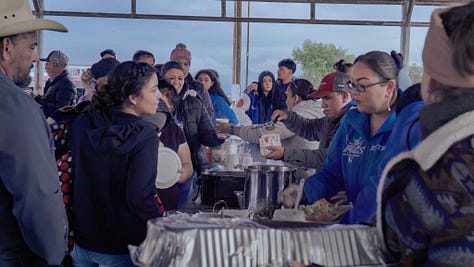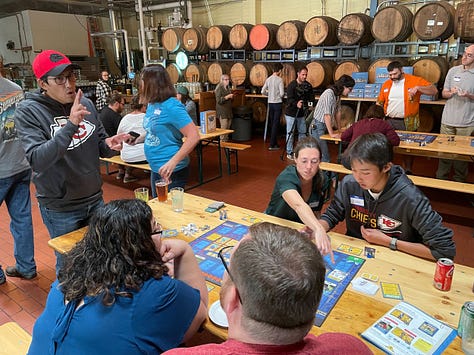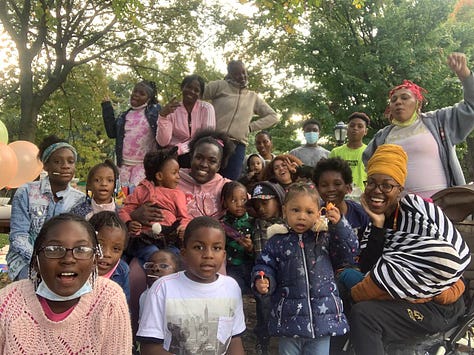We’ve squeezed the “life” out of civic life
Civic renewal must begin with an account of how we, the professional managers and control freaks, have devitalized the civic ecologies we now seek to “fix.”
This week’s post builds, in part, on our surprisingly popular piece on “The lies we tell ourselves.” Aaron Horvath and I started working on this as a shared essay, but soon realized we had complementary pieces we wanted to write. Still, I’m indebted to him for helping to shape and refine my thinking, particularly in the early stages of writing. This was one of those pieces that wasn’t easy to write, but I felt like I sharpened my views in the process. - Sam
I have a confession: As much as I want to be a cool, go-with-the-flow kind of guy, I’m a total control freak. (I’m less Rick Rubin and more Rob Lowe in Parks & Rec). In my personal life, I live by my daily calendar — three hours for deep work, one and a half hours to work out, even calendar invites for calls with friends and family. In my academic life, I have not one but two degrees with “administration” in their name. In my professional life, my proudest accomplishment with the Armed Services Arts Partnership, at one point, was developing an 18-month randomized control trial on our programs. If you were to ask me about the professional skill I’ve most developed over the last five years, I’d respond with: “slide decks.”

In other words, I’m indicative of a hidden problem with civic life today. Over the last half-century, and the last 30 years in particular, the work of community and associational life has increasingly become the domain of people like me: a “professional managerial” or “symbolic capitalist” class of nonprofit leaders and “social innovators,” supported by a panoply of funders, impact investors, consultants, think tankers, and academics. Educated in how to become “effective managers” at fancy schools and fancy consulting firms — and influenced by the underlying principles of rationalization, managerialism, and technocracy — our collective actions and ways of being have inadvertently wrangled civic life under centralized, managerial control.
As we’ve applied the philosophies, tools, and practices of managerialism to civic life, we’ve begun to approach it as a controllable, predictable, and scalable machine. This machinization of the civic sphere has shifted its modus operandi from participatory membership to specialized management. Our well-oiled civic machine is powered by professionalized fields of credentialed managers, which have displaced voluntary associations of ordinary citizens. It’s optimized by quantitative measures of “impact,” which privilege what can be measured over what truly matters. And it’s linked by disembedded networks of instrumental relationships, which take precedence over local, rooted communities built on reciprocal relationships.
But what’s left out from our civic machine is the actual life of civic life: the particular, local ecologies of people, families, associations, and culture that make our communities and democracy actually work. There appears to be a growing realization that to stand any chance of renewing our democracy, we must renew these local communal ecologies. But this renewal must begin with an account of how we, the professional managers and control freaks who built the civic machine, have devitalized the very civic ecologies we now seek to “fix.”
Powering and optimizing the civic machine
Our account should begin with an honest assessment of how professionalized management, the power system of the civic machine, has crowded out civic membership. When we create “spaces” or build “fields” — as we’ve done throughout the social sector — we end up professionalizing and specializing sets of activities. And when we professionalize and specialize these activities, we signal that these activities are only for some people and not for everyone else. Professionalization and credentialization can help increase the “quality” of practice within a field, but this is done by intentionally erecting barriers to that practice — both through the training and credentialing activities themselves, and through the creation of “insider” cultures, languages, and networks. (For some domains, like health and medicine, this is often the right approach — I don’t want to rely on my neighbor for a prostate exam).
But the creeping professionalization of civic life has shifted the “everyday democracy” responsibilities of community membership and participation to the domain of nonprofit management. As credentialed managers assume the roles once held by ordinary citizens and neighbors, formal programs take the place of informal groups and activities, and participation and membership become experiences that are channeled and controlled rather than seen as holistic ways of being. In the face of this expanding civic managerialism, little room is left for the participatory, emergent messiness of local civic life.
If professionalization is the primary mechanism for spawning new managers, measurement is perhaps the single greatest instrument for these managers to exert control. And the primacy we’ve given to measurement to “optimize” our communities has fundamentally shaped and narrowed the civic sphere. That’s because, when we measure civic life, we’re not just objectively assessing reality, we’re building new realities. As Aaron Horvath put it in a Q&A last year, “[proponents] would like to think that evaluating is merely capturing the action on the field. The reality is that evaluation, itself, is actually on the field and shaping the state of play.”
In essence, measurement criteria have become the de facto rules of the game, dictating the players on the field, the gameplans they utilize, and how they actually play. Our emphasis on measurement influences who can lead civic groups: we privilege those with more access to funding, networks, and specialized expertise to do the measurement, while punishing those without this type of access (often, those in less well-off areas, with less educated personnel, and less formalized structures). Measurement also changes how civic groups relate to their members. As we implement quantitative measurement methods that are mediated by surveys and data tools, we abandon deeper ways of knowing that are mediated by human relationships. Validated scales take primacy over our first-person experiences, longitudinal data substitute for generational wisdom, and we’re essentially told: “Don’t believe your eyes, ears, and heart until the survey results come in.”
But perhaps most important of all, measurement shapes what civic groups prioritize. In the effort to produce measurable economic, health, or social outcomes, civic organizations are forced to de-emphasize the things that are harder to measure. But it’s often the ineffable and undefinable — our connections, communities, commitments, and culture; that is, the “connective tissue” of our lives — that are essential to our civic flourishing. Funders may say things like, “Measure what matters!” Yet, when what truly matters can’t be measured, what can be measured ends up becoming the only thing that matters. Far from “driving impact,” this dependence on measurement has arbitrarily constrained the civic possibilities we can experience in our communities.
Machinizing relationships — in function and form
All of this — the philosophy of rationalized managerialism, the practices of professionalization, and the tools of measurement — are transforming how we relate to relationship itself in the civic sphere. In the process of building the civic machine, our relationships within and to civic life have become, perhaps predictably, more mechanistic in nature.
The first relational transformation is one of function: As we implement our managerial approaches throughout civic life, we contribute to the instrumentalization and transactionalization of our civic relationships. In the quest to “achieve scale” and “create impact,” we treat citizens as customers to be delivered a set of programs, services, or products, rather than as agentic “members” of a community, responsible for honoring its past, stewarding its present, and co-creating its future. We see this type of participatory membership — with all its meetings and complex relational dynamics — as a major nuisance, consuming valuable staff time and hindering the efficient production of measurable outcomes. In the logic of managerialism, everything is reduced to the instrumental: participants are expected to complete a program in order to achieve an outcome, while nonprofits and governments are expected to report on these outcomes in order to receive more funding and provide more programs.
But local communities are not machines in which instrumental inputs simply lead to predictable, countable outputs. They are more like ecologies of reciprocal, interconnected relations among humans, groups, place, and culture. They are what Wendell Berry calls a “Great Economy,” defined not by a “‘sum of its parts,’ but a membership of parts inextricably joined to each other, indebted to each other, receiving significance and worth from each other and from the whole.” By reducing the civic sphere to a set of transactions, we remove the “unpredictable human funk” of connections, participation, membership, and reciprocity that nourish the relational soil of civic life.
The other relational transformation is one of form: As we increasingly manage and measure civic life, we begin relating to it as a disembedded, homogenized abstraction. We start seeing the particular “someones” who help make civic life flourish (or falter) as interchangeable “anyones.” We start treating the particular “somewheres” — with their particular histories, cultures, and relationships — as abstracted “anywheres.” National networks and network-building activities — all of those conferences and convenings and retreats we get invited to (or don’t get invited to) — substitute for locally rooted associations and relationships. Efforts to achieve broad-based national and global “scale” become the goal of “social innovators” and their funders, while the deep, durable, and committed efforts of place-based “cultivators” wither on the vine. National networks and scale are not bad things, in and of themselves. But when disembedded from work in particular places instead of grounded in it, they become tools for advancing and replicating the abstraction of the civic sphere.
Revitalizing our civic ecologies
Here’s the thing: the current manifestation of civic life that us professional managers helped create is, in actual practice, not all that civic and not all that alive. As civic leadership and participation become the domain of a select group of credentialed insiders, more of our neighbors begin to feel like they’ve been left on the outside. As civic interactions become more like civic transactions, more of our neighbors begin to feel like they’re being used. As people become treated as abstract anyones instead of particular someones, more of our neighbors feel alienated from the embodied and the embedded — their neighborhoods and communities. Active agency is replaced by passive consumption, messy relationships are replaced by efficient transactions, and in-real-life community is replaced by disembodied screens.
This reality is, in many ways, what we should expect to happen when our rationalized managerialism is taken to its logical end state in the civic sphere. By building our communities on the same principles that we build machines, we’ve squeezed the life out of civic life.
Assuming I haven’t completely lost you by this point in the essay, you’re probably thinking, “This is easy to critique, but what’s the alternative?” If professionals aren’t running the programs, who will? If we don’t measure, how will we know what works (and, more importantly, how will we get the funding we need)? If we don’t “scale” beyond one place, how will we address the magnitude of the problem? And if we stop going to the Aspen Ideas Festival, how will we sustain our annual summer tradition of swimming with David Brooks?
None of these questions have binary answers (except the last one: invite David Brooks to the community pool). Professionals should still play a role in civic life, but there should probably be fewer of us, and we should draw on less managerial approaches. Measurement should still be used, but it should be applied more selectively and with more aligned, holistic methods. Scale should still be a goal, but it should be achieved through locally rooted networks that are connected across place, not top-down organizations. This is not a positive-sum situation: these changes involve real tradeoffs for many of us professional managers and our organizations.
But if we’re serious about “fixing” civic life — and I believe many of us are — we need to do something different.



The good news is we’re at the start of a generational moment of civic renewal — and we all have the opportunity to revitalize and rehumanize our desiccated and machinized civic life. This must involve approaching our civic life as the civic ecology it truly is, and drawing on an entirely different set of principles and practices to nourish its soil. Small “d” democratic and participatory processes must be prioritized over technocratic ones. Proximate, local leadership must be prioritized over distant, centralized control. Relationships, themselves, must be prioritized as essential ends, rather than instrumentalized means toward other ends. And we must approach the work of civic renewal generationally, not as a technical “problem” to be “solved” along a 3-, 5-, or even 10-year time horizon.
Fortunately, the seeds of this renewal are already being planted in communities across the U.S. Several community foundations, such as the Rhode Island Foundation and Central Valley Community Foundation, are reimagining their missions to become long-term cultivators of their communities' civic health. Locally rooted groups like Warm Cookies of the Revolution and CivicLex are experimenting with joyful, participatory practices to reconnect local residents to one another and to local civic life. Myriad new neighborhood groups are popping up — everywhere from Brownsville, NY, to South Dallas, TX, to Birmingham, AL — with an intentional commitment to connect neighbors with neighbors. Even some local governments are becoming more participatory and relational, too: supporting everything from citizens’ assemblies, to participatory budgeting, to neighborhood block parties.
In this civic world that we’re in the early stages of regenerating, our local civic ecologies will look much more like permacultures than monocultures. Rather than trying to “control X to accomplish Y” from afar, particular people would be equipped to cultivate the civic ecosystems of their particular places — consistently and iteratively, over time. This world would be less predictable, less controlled, and less efficient. But it would be defined by something far more valuable: actual life.







You didn’t know this was gonna happen but maybe you did… every word of this piece was crafted for me to grapple with, right on time.
Just 12 hours ago I internally smiled and patted my back settling on a civic bridging strategy that, while much of the plan may survive and be worthy of pursuing, contains many/most of the flaws you’ve identified so clearly here.
It’s an uphill battle to make these shifts when not in the world as-it-should-be but you’ve touched on truths and goals I already know to be worthwhile yet struggle to implement in the world as-it-is.
The change I’m working toward, effective transformation of our statewide public school system, is desperately needed. Harm and dysfunction are profound, dehumanizing at an unacceptable scale, and a whirlpool for our state’s moral and economic past, present, and future.
There are arduous, practical pathways to spur change (through fostering thousands of purposeful civic conversations that I still feel proud to be developing). But this piece is going to push me short and long term to seek the both/and.
I’ll also be reaching out to break some virtual bread soon.
I don’t have David Brooks in a pool for you, but I sure do have an extra kayak (includes paddle, life vest, and a marked up copy of The Second Mountain), great local beer, and 10,000 lakes to share…
Terrific piece. It reminds me of my interactions with the peer community when I was state behavioral health director. That community was hungry for the official structures of legitimacy: things like licensure, accreditation, certifications, etc. I’d always tell them, “don’t make the same mistakes of the broken system you are trying to join–credentialism, hierarchy, etc.”
At the end of the day, though, it was about money. Those same structures unlocked funding from Medicaid and other state/federal grants. If you want relational, community-rooted work, you have to redesign the way funding flows.